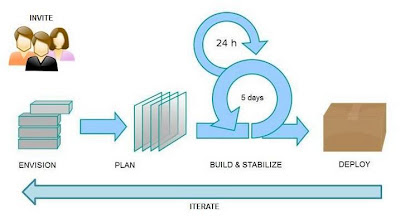I've been exploring the idea of flipping assessment for a while. It started with my work as a
TA during my M.Ed graduate studies, also explored it during my time with
WikiEducator, it was confirmed as I reflected upon my graduate studies and every community of practice since, and I designed it into a language learning portal I architected a while back. Why do we have people who have already completed the work (and possibly long since forgotten the details) assess those currently working on building their understanding. Why not have the cohort of learners most current with the subject provide the bulk of the assessment. Why not
flip the assessment and have the novice learners assess those a few steps ahead on the same learning journey? I believe the cohort of novice learners (working with master learners) would be the most motivated to develop understanding and invest the most time in the assessment of another learners work. Particularly, if the assessment event is a formative event and just a part of the overall assessment.
This is what I envision for flipping assessment. This wouldn't be a complete flip, where novice learners do
all of the assessment, but they would have an increased role in the assessment of the learning cohort. As I see it the elements of the diagram are as follows;
- Working from left to right a person masters a subject.
- A subject within a knowledge domain is exactly that, a complete subject that fits within a larger domain of knowledge. An example would be baking bread is a subject within the food preparation (or cooking, or baking) knowledge domain. And the subject of bread baking is large enough to be considered a subject within itself where someone would develop an expertise.
- An Interested learner is a person with an interest in the subject, who never actually studies the subject, but they will read about it and not shy away from a discussion.
- A Novice learner is a person committed to learning a subject. They actively seek out information, read and consume information about the subject. They participate in learning events (online and otherwise) to increase their understanding. They would even take a course from a traditional institution.
- A Master learner is someone nearing completion of their studies of a subject. They could be considered to have "almost" mastered the subject.
- Teaching assistants are people who are rewarded for providing mentorship to learners. This role is a part of traditional institutional learning, and plays a role in helping learners master a subject. Teaching assistants are often much closer to a subject than a professor as their learning was more recent and, given their role, they are closer to the learning cohort due to their frequency of personal interaction with the learners.
- A Seasoned learner is someone who has mastered a subject, and is not actively involved in learning the subject. They do continue to read about the subject and actively seek out new and related information. They are members of communities of practice regarding a subject and occasionally engage and/or contribute to the community. They are very current with the subject and provide feedback and guidance to other community members.
- The Professors are well, professors. They are most often people with Ph.D`s who are very active in furthering and adding to a domain of knowledge. Their focus is not always on teaching or the details of a specific subject within their chosen domain of knowledge, unless that is their area of research. I guess what I want to say is that a professor won`t be focused on the subject matter (and the learners study) of an undergraduate level course and its specific subjects. This is not to say professors can`t be an amazing resource for someone learning a new subject. A professors time should be used very wisely, but finding ways to encourage their engagement is good.
- The Experts are people who, through a number of different methods, have become experts in a subject. They continue to be experts by ongoing reading, personal research tasks, and involvement with online communities. They sometimes lurk (even engage) in online learning communities. Getting experts to contribute to assessment would be great, and finding ways to include them is time well spent.
My plan to implement flipped assessment
I want to experiment with the idea of having novice learners assess the work of master learners. Both the novice and master learners need to be active within the same learning journey, where the master learner is only a few lessons (or tasks) ahead of the novice. The idea being the novice is beginning their study of the subject and the master is almost finished. I want the novice learners to read and understand the work of a master learner and give it an assessment. If the novice has questions, they ask them of the master learner. The master learner also has to encourage the novice learners to assess their work. Without this assessment neither the novice or the master will progress to completion. If novice learners want to team up to assess a master learners work, they can. This flipped assessment will not be the only assessment the learners will receive as a peer based summative assessment will occur when a learner has finished their study of the subject.

I plan to implement this flipped assessment in the
Badge System Design challenge I am creating in P2Pu. The design of the challenge is iterative in that we will be covering the topics more than once with increasing depth as the challenge progresses. This iterative approach allows for a task earlier in the challenge to include the assessment of another learners completed works later in the challenge. Essentially, a novice learner is assessing the work of a master learner.
Flipped Assessment.
If you are interested in
the previous background chat discussing this idea it can be found in Google+.









